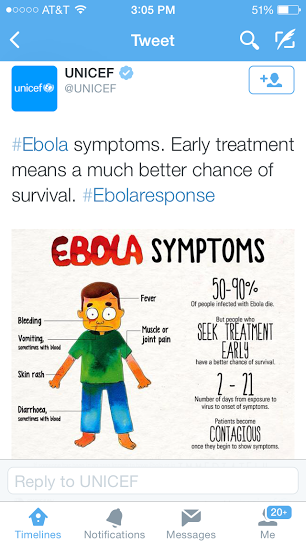Social Media Websites Create Panic About the Ebola Virus
November 14, 2014
“OMG DO I HAVE EBOLA?” This fear mongering of ebola can be found on any social media website since the first diagnosis of ebola in America. So why then do so many people still have very little idea what ebola even is?
Ebola hemorrhagic fever is a virus spread by contact with the bodily fluids of an infected person. Unlike the flu, ebola is not contagious if the person is not symptomatic. The initial symptoms are those of the flu: fever, fatigue, muscle pain, sore throat, and headache. Later ebola develops into vomiting, diarrhea, rash, impaired kidneys and liver, and internal and external bleeding.
The disease originated in in Zaire (now the Democratic Republic of the Congo) in 1976, and is named after the Ebola River in Zaire. Since then, there have been over seven thousand cases, and almost four thousands deaths. Fruit bats are the carriers of ebola, and because it is a disease that affects primates, ebola is often spread through contact with infected monkeys.
The most common misconception perpetuated by technology and social media about ebola is that it is highly contagious. This can be the explanation for many of the panic based questions fluttering around many websites.
Ebola is not an airborne disease and there is little chance that it will become one. Although the virus does mutate a small amount each time a person gets ebola “The likelihood is remote squared” said Peter Jahrling of the National Institute of Allergy and Infectious Diseases.
If an infected person touched an object that you touched, the chance you would get ebola is very small. “Ebola is a vicious virus inside the body, but it dies very quickly on surfaces,” CDC spokeswoman Abbigail Tumpey said. “It’s a very wimpy virus.”
Countries like Guinea, Sierra Leone, and Liberia that have an ebola outbreak have poor health infrastructures. In West Africa the disease spreads easily due to lack of space in hospitals, poor treatment, and dangerous burial practices (dead ebola patients are still contagious).
Conversely, America has a strong health infrastructure and more medical advances; ebola patients are quarantined and given experimental treatment and intensive care. Compared to over 3,500 deaths in Africa, America has treated only eight cases of the disease, diagnosed three, and had only one death.
Despite America’s capability to control ebola, media hysteria has grown rapidly. Twitter especially is full of conspiracy theories: the CDC has been infecting people by putting the virus in common vaccines, ebola was created by the government, ‘if I met a person who just visited Dallas can I get ebola?’
The answer to all of these theories are no. Steve Marmel tweeted in response to the hysteria “Quiz: Do You Have Ebola? Have you touched the vomit, blood, sweat, saliva, urine, or feces of someone who might have ebola? No? You do not have ebola.” It’s very simple.
Recently, there was a Buzzfeed article titled “8 Myths About The Ebola Outbreak.” There is also a Buzzfeed Quiz titled “How Worried About Ebola Are You Really?” This quiz will ask questions such as “On a scale of zero to ten, how concerned are you overall about Ebola in the U.S.? Once all six questions are answered, the quiz will state how worried it thinks you are about Ebola.
Best-selling author John Green is a key example of social media’s influence on the ebola outbreak. Green recently came back from Ethiopia, and was later hospitalized. Because Ethiopia shares a continent with countries affected by ebola, many people assumed he had contracted the disease.
Even if Green had ebola, “it would not have been a big deal from a public health standpoint” Green said in his vlogbrothers video. But the news headlines would have been: “Johnny went to Orlando, Florida and signed books for 1,600 people at a Harry Potter convention, all of whom are now veritably dripping with the disease!” Green continued.
Like John Green’s case, there have been many ebola false alarms since Thomas Duncan was diagnosed. From the patient in Washington DC to the passenger on the plane to Florida, to here in Westchester, America is on hyper alert.
Recently, there has been an Ebola scare in New York City, with a doctor who has come in contact with the disease. New York City is a city that many Hackley students frequently visit of even live in. The media has been tweeting and publishing many articles trying to calm the people to New York state, who are all in raging panic. `
The CDC is receiving over 800 calls a day regarding possible ebola patients, compared to the 50 daily before Duncan’s diagnosis. Despite these calls, there has only been two additional cases of ebola.
Why then, have Americans as a whole freaked out about ebola? Is it the result of the rise of social media that allows false rumors to be spread to a large audience? How then, can American media change to prevent hysteria like this in the future, or does it want to?

